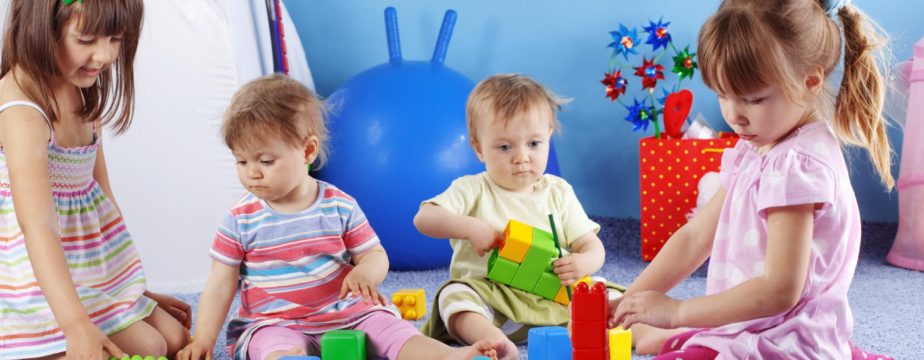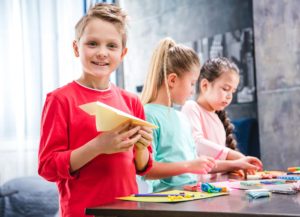Playing Creates Independent Learners

“We are never more fully alive, more completely ourselves, or more deeply engrossed in anything than when we are playing.”
~ Charles Schaefer
The experience of playing changes the neuron connections at the front end of your brain, according to Sergio Pellis, a researcher at the University of Lethbridge in Alberta, Canada. Research indicates that without play experience, those neurons do not change. He added that children must be engaged in free-play to trigger neuron development.
In free play, children create the rules and parameters of the activity. Through play, they share, compromise, and utilize flexible thinking. The brain builds new circuits in the prefrontal cortex to help it navigate these complex social interactions. Allows children to become independent, self-directed learners using social strategies to resolve conflict and work together.
Monkeys play. Dogs play. Rats play. Even octopuses play. And without any instruction, children of all races and genders, in all cultures, invent and reinvent play in every generation.

A growing body of behavioral research establishes relationships between a child imaginative play and development in several areas, including language (Toub et al. 2016), executive functions (Tominey & McClelland 2011), mathematics and spatial skills (Fisher et al. 2013), scientific thinking (Schulz & Bonawitz 2007), and social and emotional development (Dore, Smith, & Lillard 2015).
Children in school spend most of their day in structured activities. After school and on the weekends, family time includes homework and reading. Planning for rough and tumble or free play each day could help with brain development, stress, and social adjustment.
Depression and Anxiety Rising Among Children
Rates of deRates of depression and anxiety among young people in America have increased for the past 50 to 70 years. Moreover, according to Psychology Today, children’s freedom to play and explore independent of direct adult guidance and direction has declined in recent decades.
Increasingly child development experts suggest that too much emphasis on structured activities could result in negative rather than positive outcomes for children. Children who are always busy have little time to get in touch with their inner selves. Most of us have learned to perceive boredom negatively, but we are now beginning to understand the value of boredom. Boredom can act as a catalyst to provoke the generation of imaginative ideas, self-exploration and can push kids to dig deep and discover their own areas of interest. In addition, child psychiatrists and behaviorists see a direct link between loss of free play–particularly unstructured play outside–and mental health issues.
Using data from anxiety tests given to students over several decades, researchers found the following:

When children play independently, they learn how to problem-solve, negotiate, and innovate. Structured and closely supervised play may not foster the pride in accomplishment parents hope to encourage. However, making having adventures and making discoveries can encourage children to learn and grow. By satisfying their curiosity, a child can prove to be their own best teacher if they are persistent. Recent studies show that oral language and the diligence and persistence to stick with a challenging task predict future academic success.
In the ’60s and ’70s, the popular TV show character Timmy and his dog Lassie were allowed to roam freely from breakfast to dinner. In many communities, parents have now penalized parents for allowing their children to play alone in the neighborhood—the magazine U.S.A. Today reported on April 15, 2015, that Danielle and Sasha Meitiv had been accused of child neglect for allowing their children to play at the park alone. The park is eight residential blocks from their home, which is located in a safe suburban area. The children also occasionally walked home from their school, located a few blocks from home. The parents have been convicted of parental neglect and stand to lose custody of their children if they allow them to “wander” alone again.
The U.S.A. Today reported on April 15, 2015, that Danielle and Sasha Meitiv had been accused of child neglect for allowing their children to play at the park alone. The park is eight residential blocks from their home, which is located in a safe suburban area. They also occasionally walked home from their school, located a few blocks from home. The parents have been convicted of parental neglect and stand to lose custody of their children if they allow them to “wander” alone again.
Arts and Crafts as Elements of Free Play

Alena’s husband is a plumber. Last week as he brought home odds and ends of PVC pipe for their children. Alena set the pieces out in her backyard. When she observed the children 30 minutes later, they had used the different sizes and shapes to design various patterns. Complex negotiations took place when two of her children wanted to use the same piece. Finally, after a brief debate, they decided to work together and combine their patterns. These types of activities lay the foundation for math, linguistic, and social development.
Another way to create open learning experiences at home, in the evenings weekends, is to set up open-ended art projects. For example, parents can save up toilet paper tubing, boxes, bottle tops, cartons, and other items to be upcycled into unique and creative works of art. Then, using a hot glue gun or bottle glue, let the students make any shape or item they desire. Finally, cover the entire project with a coating of spray paint to create a unique sculpture.
This type of activity helps children develop logic, spatial awareness, and self-determination.
Upcycling damaged items or items no longer used can inspire creative play. For example, the next time the soccer ball goes permanently flat, take it partially apart and let them imagine something new. Then, throw some boxes, glue, tape, and/or markers into the backyard on a sunny day. Finally, offer your cutting and spray painting talents as they make a new house, neighborhood, kingdom, or whatever else they may imagine.